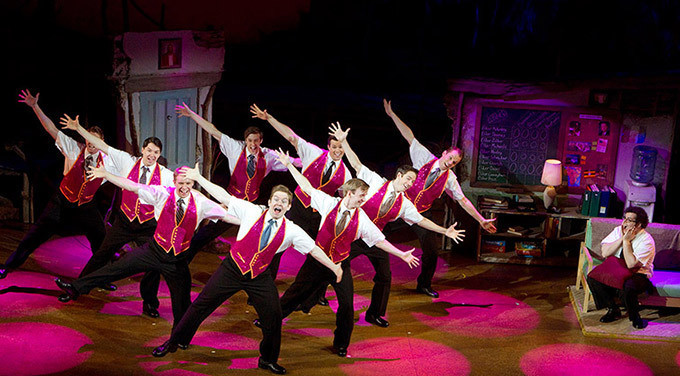Review: The Book of Mormon

The Broadway company
It’s hard to imagine such reservation about Book of Mormon. With South Park’s nobody’s sacred (except Mohammed)–satire, it lampoons Mormons, Jesus, Africans, Jews, Joseph Smith, closeted gays, and Johnnie Cochrane, to name but a few victims. But its satire dances a chorus line on multiple levels of sophistication, making fun not just of its subjects, but of the musical form itself, and it does so with such joyous wit and winking, we’re all in this together–charm that, despite the foulest language likely to have graced the Broadway stage, I didn’t see one person leave—not the Mormon woman sitting next to my left nor the father and daughter on the right (though I can only imagine the parent-child conversations afterward).
Put another way: it’s quite simply the most fun I’ve ever had at a musical—a nonstop barrage of killer one-liners, skewered pop culture morsels, high kicks, and cheesy Biblical reenactments that leaves the mind scandalized and the belly sore from laughter.
Book of Mormon returns to Portland
Keller Auditorium
July 8–20, 2014
Our journey begins at Mormon missionary headquarters in Salt Lake, where a gaggle of missionaries, looking like earnest penguins in their ties and nametags, nary a hair out of place, go through their final practice of ringing doorbells and singing their script in the delightful, vocally layered “Hello.” We meet our protagonists, the handsome, perfect, and adored Elder Price (played by West End actor Mark Evans with entitled, Ken Doll charm), and the chubby, “imaginative,” can’t seem to get Mormonism–right Elder Cunningham (played with bumbling wit by sketch comic Chris O’Neill), who are paired together as the odd couple by the missionary directors, inciting Price to sing the most delicious farce of the buddy song, “You and Me (But Mostly Me).”
Price dreams of being sent to Orlando, Florida, but the two are instead sent to Uganda, which Cunningham can’t even pronounce, where they encounter a village wracked by famine, poverty, AIDS, and violent warlords, not to mention entirely lacking in doorbells. Price’s God-given perfection buckles under the foreignness and the pressure, and he deserts Cunningham, who’s left to “Man Up” and convince the Ugandans to embrace the teachings of Joseph Smith alone. Using his imagination to fill in for the fact that he’s never read the Book of Mormon because it’s too boring, he makes it relevant by incorporating AIDS, dysentery, and the Death Star, leading him to become the most successful missionary in Africa, before it all goes horribly, hilariously wrong.
The entire show is a pirate’s plundering of Broadway’s Old and New Testament. “Hello” harks back to "The Telephone Hour" in Bye Bye Birdie. “I Believe,” a song by Elder Price highlighting the absurdity and racism of Mormonism’s literal doctrine (“I believe, ancient Jews built boats and sailed to America” and “I believe, that in 1978, God changes his mind about black people”) riffs off of The Sound of Music’s “I Have Confidence.” And, of course, regular assaults are lobbed at the Lion King to incredible comedic effect, from a masked African American dancer hired by their parents in the airport to see them off, despite having never seen Africa; to a dead Lion King–style puppet dragged across the village in the opening Africa scene; to an uproarious corruption of “Hakuna Matada,” in which Elder Cunningham asks, “Does it mean ‘no worries for the rest of our days?” only to find it means the blasphemous opposite. There’re also pokes at The King and I, Annie, Wicked, and the B-52’s “Love Shack,” among others.
Yet despite the snark of its satire, the play is fundamentally an homage, both to musicals, and, as Matt Stone has said, “an atheist's love letter to religion.” The choreography, by Casey Nicholaw, who co-directed with Trey Parker, is incredible—the missionaries channeling here Fosse (at one point in pink sequined vests with jazz hands), there Rent, with unadulterated (and exaggeratedly swishy) Broadway glee, while the Africans are all Fema and Lion King. The set is grandiose and imaginative, shifting seamlessly from Salt Lake to Uganda to pioneer America to Hell. And the plot, riddled with themes of belief and doubt, is ultimately about the redemptive power of religion, assuming one takes religion metaphorically. Summing up the play—its truth and its satire—one villager tells the leading convert, Nabulungi (played by Samantha Marie Ware, whose majestic voice makes it no surprise that she spent six weeks in the Broadway version): “Salt Lake City isn’t an actual place. It’s an idea, a metaphor.”
Indeed, the Mormon Church itself has been measured in its criticism, and has even taken out ads in the program, portraying smiling, multi-racial individuals with statements like “You’ve seen the play…Now read the book.” Which is to say, even Mormons are underwriting one of the best shows ever to debase the Broadway stage.
The Book of Mormon plays through January 6. Although the Portland run sold out in barely an hour, there’re still a couple of possibilities to see it for those who didn’t snatch up tickets. There is a pre-show lottery at the Keller Auditorium before each performance for 20 tickets at $25 each. Entry begins two-and-a-half hours before the performance, with winners being drawn randomly two hours before. They will each have the option to buy one or two tickets.
Of course, there are also limited tickets on Craigslist for those willing to pay handsomely (ranging from $150 to $300), and I saw a couple of sales by people with extra tickets last minute in front of the theater if you’re willing to fly by the seat of your sacred Mormon underwear.
